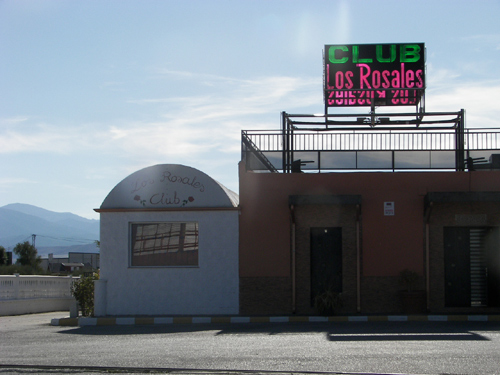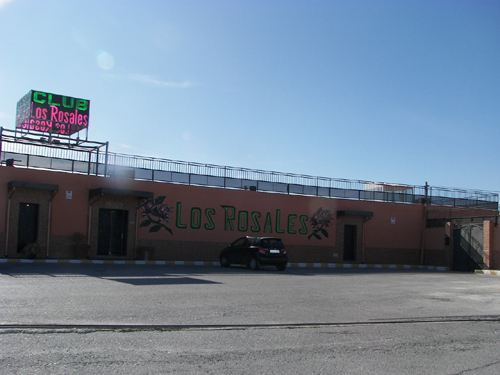Promoted or Prohibited?
Although paying for sex in Spain is not illegal, as pimping is forbidden, brothels have been banned in the country since 1956. A characteristic of Spain that has become almost as synonymous with the country as sangria and bullfighting, is the hundreds of "Clubs de Alterne" that can be found there. These thinly disguised "macro-brothels", whose huge neon signs boast "dancing girls", line the side of motorways almost as frequently as petrol stations. The country's ambiguous laws involving prostitution mean that running a brothel is neither completely legal nor totally illegal. Brothel owners exploit this inconsistency, claiming that they are hoteliers and are merely renting rooms out to women who work for themselves.
 |
| Macro brothels line Spain's motorways |
According to a Taipei based advocacy group, it is estimated that Taiwan is home to over 600,000 sex workers who work in "tea houses". Although unlike Spain's arguably "out of sight, out of mind" attitude, there have also been rumors of a red-light district due to be set up in Taipei. Of course these new policies, following the outlaw of the trade 11 years ago, have inevitably caused controversy.
The core argument for regulating the sex trade is twofold: According to the Barcelona reporter, the industry in Spain has been estimated at 18 billion euros. In light of this statistic, giving these women the same employment rights as more "honorable" professions, including paying tax, would net the tax man a more than tidy sum. The other argument is by controlling the activity it would inevitably reduce sexual slavery and trafficking. Nick Snelling, author of "Prostitute Nation" and "Confessions of a Call Girl", is in favor of regulating the trade and reiterates the views of PunterNet owner, that it would reduce associated crime.
According to Snelling, "Undoubtedly the answer is to legalize prostitution and regulate it. It is the only way of removing it from the hands of the criminals and protecting all the parties involved."
While Harriet Harman remains completely averse to the legalization of prostitution, a proposal of the UK Government is to step up action to tackle human trafficking in the run up to the 2012 Olympic Games. Failing to see the connection between making prostitution illegal resulting in an increase in human trafficking, Harriet Harman said to her colleagues at the Labour conference: "We're determined to ensure that, especially in the run up to the Olympics, international criminal gangs don't trick and abduct women from abroad and sell them for sex in London."
The crux of the argument is morality. In the words of Mrs Harman, in "fuelling a demand" by regulating sex work and encouraging prostitution review Internet sites, a "very sinister development" in female exploitation and equality is emerging. But for this "blight of a politician's agenda" to be finally concluded, the social stigma surrounding earning money out of sex needs to be redefined.
 |
| Club La Rosalas, Granada Spain |
While loosely disguised, neon lit "lodgings" are an ingrained feature of the Spanish landscape, perhaps encouraging these girls to escape their adopted bedrooms and "offer their assets" on prostitution review websites would prove advantageous. It would not only prevent "turning a blind eye" on what goes on in these alluringly dazzling establishments, but also ebb politicians from "conveniently" skirting the subject until a sinister report forces the topic back into the political limelight.
Whether the Chinese mainland will follow suit of Taiwan and legalise the act of prostitution in order to control it remains uncertain. But at least the Chinese are not frightened of experimenting with strategies to gain results and cannot be accused of just "dutifully" courting media hype.
 0
0 






